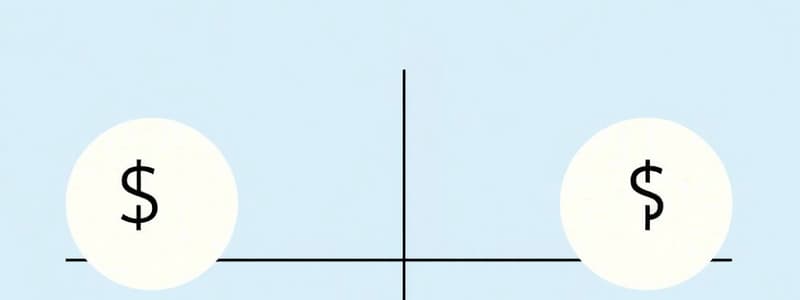Podcast
Questions and Answers
What is economics?
What is economics?
Economics is the study of how choices are made in the face of limited resources and unlimited wants. It focuses on the production, distribution, and consumption of goods and services, and it's a science in methodology and an art in application.
What are the two basic assumptions of economics?
What are the two basic assumptions of economics?
The two basic assumptions of economics are rationality and ceteris paribus. Rationality assumes that every economic agent makes decisions to maximize their utility or profit, while ceteris paribus means that all other variables are held constant when analyzing a specific relationship.
Explain the concept of trade-offs in economics.
Explain the concept of trade-offs in economics.
A trade-off occurs when one chooses to gain something while losing something else. It's a common economic concept, as resources are scarce and individuals must prioritize their choices. In the context of the economy, the government often faces the trade-off between equity and efficiency, where maximizing efficiency may lead to inequality, and maximizing equity may compromise efficiency.
What is opportunity cost? How does it relate to decision-making?
What is opportunity cost? How does it relate to decision-making?
Describe the concept of the production possibility curve (PPC).
Describe the concept of the production possibility curve (PPC).
What are the three main questions that economics seeks to answer?
What are the three main questions that economics seeks to answer?
What are the major players in any economy?
What are the major players in any economy?
What are the two main types of economic analysis?
What are the two main types of economic analysis?
Microeconomics is only concerned with the behavior of individual consumers.
Microeconomics is only concerned with the behavior of individual consumers.
Macroeconomics is generally more focused on a specific industry compared to microeconomics.
Macroeconomics is generally more focused on a specific industry compared to microeconomics.
What is the main difference between positive economics and normative economics?
What is the main difference between positive economics and normative economics?
Why is economics considered both a science and an art?
Why is economics considered both a science and an art?
Which of the following statements best describes the deductive method in economics?
Which of the following statements best describes the deductive method in economics?
What is the difference between microeconomics and macroeconomics?
What is the difference between microeconomics and macroeconomics?
The growth of macroeconomics is largely attributed to the Keynesian Revolution of the 1930s.
The growth of macroeconomics is largely attributed to the Keynesian Revolution of the 1930s.
How does the government's role in a market economy impact equity?
How does the government's role in a market economy impact equity?
Positive economics aims to provide value judgments about economic issues.
Positive economics aims to provide value judgments about economic issues.
Normative economics deals with statements that are generally not verifiable and involve opinions on what should be.
Normative economics deals with statements that are generally not verifiable and involve opinions on what should be.
Flashcards
Flashcards
Flashcards
Digital or physical cards used for learning, recall and memorization of information.
Learning
Learning
The process of acquiring new knowledge, skills, or understanding.
Recall
Recall
Retrieving information from memory without external cues.
Memorization
Memorization
Signup and view all the flashcards
Information
Information
Signup and view all the flashcards
Concept
Concept
Signup and view all the flashcards
Key Concepts
Key Concepts
Signup and view all the flashcards
Digital Cards
Digital Cards
Signup and view all the flashcards
Active Recall
Active Recall
Signup and view all the flashcards
Memory
Memory
Signup and view all the flashcards
Study Notes
Introduction to Economics
- Economics solves problems of unlimited wants with scarce resources.
- It studies choices, societies, and human behaviour.
- Economics analyses production, distribution, and consumption of goods and services.
- It applies scientific methods and artistic interpretations.
Economic Activity
- Economic activity encompasses all production and exchange within an economy.
- Economic activity measures the buying and selling over a period of time.
Basic Economic Assumptions
- Rationality: Economic agents (consumers and producers) aim to maximize utility (consumers) or minimize costs (producers).
- Ceteris Paribus: "All other things being equal"—isolating variables for study.
Trade-offs
- Trade-offs: Obtaining one thing often necessitates giving up another.
- Examples: Food vs. clothing, work vs. leisure, equity vs. efficiency.
- Equity: Fair distribution of economic benefits.
- Efficiency: Maximizing output from scarce resources.
Opportunity Cost
- Opportunity cost: Value of the next best alternative forgone when a choice is made.
- Decisions involve weighing trade-offs and evaluating opportunity costs.
Production Possibility Curve (PPC)
- PPC illustrates scarcity and opportunity cost graphically.
- A curve depicting different combinations of goods producible with available resources and technology, given full employment.
- Points on the curve represent efficient production levels.
- Points inside the curve represent inefficient production.
- Points outside the curve are unachievable.
- Shows trade-offs in production.
- The slope of the PPC represents opportunity cost.
- Technology and resource shifts affect the PPC curve.
Nature and Scope of Economics
- Major Players: Consumers (Demand), Producers (Supply) , Market and Govt.
- Microeconomics analyses individual economic units (consumers, producers, firms, or industries).
- Macroeconomics studies aggregates like national income, employment, or economic growth.
- Positive economics: Factual analysis—describing economic relationships.
- Normative economics: Value judgments—arguing how things ought to be.
Basic Questions in Economics
- What to produce?
- How to produce?
- For whom to produce?
Studying That Suits You
Use AI to generate personalized quizzes and flashcards to suit your learning preferences.




